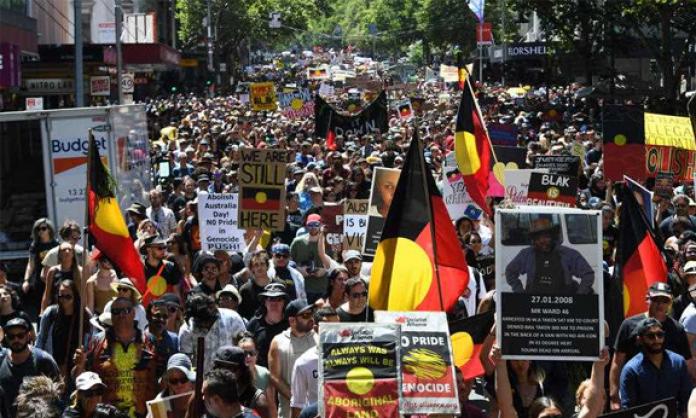Despite desperate attempts by prime minister Scott Morrison to breathe life into Australia Day – pledging millions of dollars to build a replica of Captain Cook’s ship, the Endeavour, to re-enact its circumnavigation of Australia, which it never did, and threatening to ban councils from holding citizenship ceremonies if they refuse to hold them on 26 January – Invasion Day rallies continued to grow this year.
Tens of thousands marched across the country to protest the grotesque celebration of invasion, dispossession and genocide that is Australia Day.
Dwarfing official celebrations, in Melbourne tens of thousands assembled outside state parliament. It was difficult to move through the tightly packed crowd. Speakers highlighted the continuing crises of Indigenous Australia, including appallingly high rates of youth detention, police brutality and deaths in custody.
Rally organiser Meriki Onus called for the repeal of the public drunkenness law, which is often used to target Aboriginal people such as Tanya Day, who was arrested on the charge and died in custody in 2017. Tanya’s daughter was an organiser and speaker at the protest.
“We have a prime minister that wants to divide us”, another speaker said. “He wants to erode whatever little we do have. We have a premier that calls himself progressive but sends out a small army of cops onto us when we are peacefully mourning [at the Invasion Day dawn service] today … There is no date appropriate to celebrate genocide; there is no date appropriate to celebrate land theft.”
It was their first Invasion Day rally for many. Sarah from Latrobe University had been to rallies for Palestine and Syria but not 26 January protests. She told Red Flag: “As many people as possible should be here now, to stand up to a government that uses its power against refugees, Muslims and Indigenous [people]”.
“If you don’t support Australia Day, you have to be here”, said regular attendees Ross and Amanda. “You just have to be here.”
Chantel, another first time attendee and a social worker, said that colonisation “was the first in a long line of human rights abuses that are continuing today”.
The Sydney march attracted tens of thousands, and several thousand came out in Brisbane, Hobart and Adelaide. In Canberra, 800 marched from the centre of the city to the Tent Embassy. A similar number turned out in Perth.
Banners and chants delivered the same messages in all states: “always was, always will be, Aboriginal land” and “no pride in genocide”.
There were actions internationally, including the unfurling of an “Abolish Australia Day” banner across London’s Westminster Bridge and a protest by Australian expats in Berlin.
Back in Melbourne, Onus, to deafening cheers, closed the event with a call to arms: “We’re not going to go away – we’ll be back next year! And we’re going to keep fighting between Invasion Days too!”




